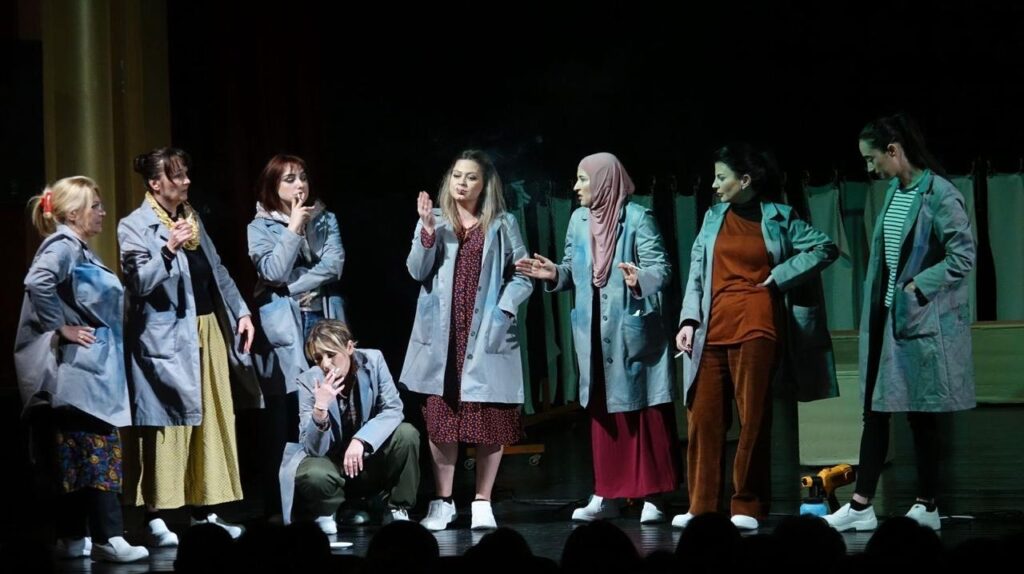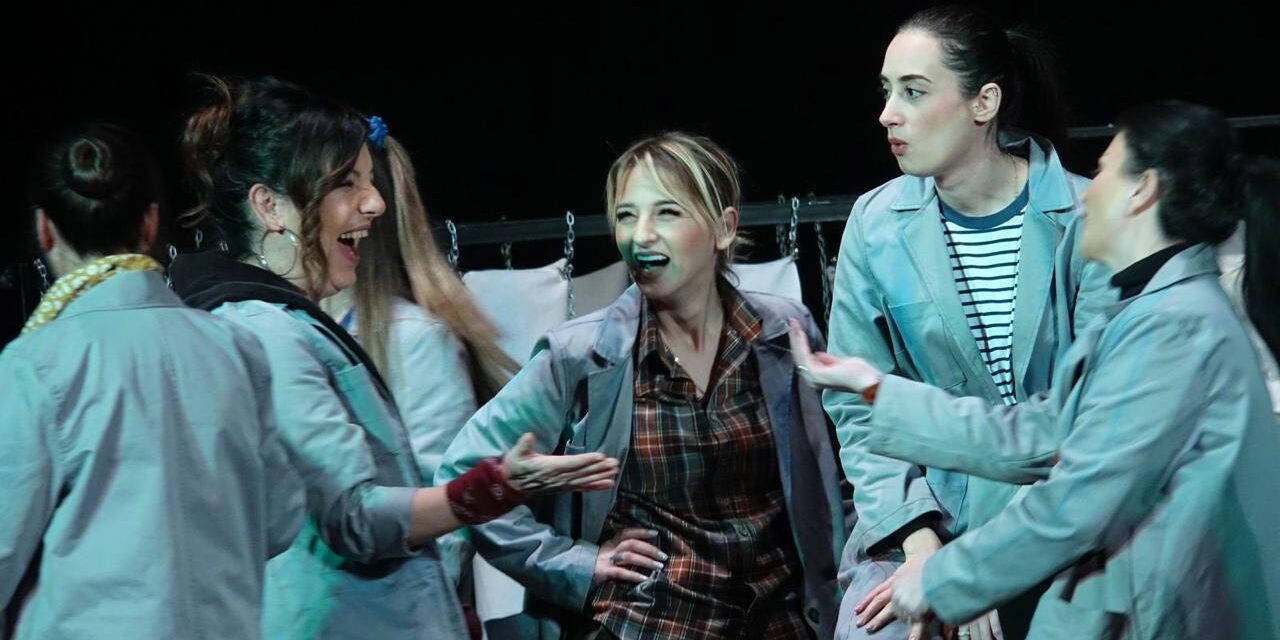National Theatre of Albania (Viktoria/ Eja në teatër), premiere December 2023
Is it worth selling your dignity for just seven minutes? The question may sound very abstract but it’s explored in a brilliant way in 7 Minutes, which was performed as part of this year’s FemFest festival. The play examines how people are driven to exploit and humiliate themselves just to survive and the impact one’s personal decisions can have on the lives of many others. In a society designed to be collective, personal needs must be well-weighed before they are fulfilled.
Written by the Italian author Stefano Massini (author of The Lehman Trilogy, a play about the banking dynasty which was a hit on UK and US stages) the text has been translated into Albanian by Aida Baro and directed by Driada Dervishi. The play is set in a textile factory in which 11 workers must make a decision, which on the surface is seemingly insignificant, but it has the potential to change the future. of the market. The new owners of the factory, backed by foreign investors, have only one condition for not closing the factory, that the 200 factory workers give up seven minutes of their lunch break and work these extra minutes without pay. To make this decision, 11 women are chosen as representatives of all the other workers – and they have only one hour to vote.
The play has been so successfully translated into an Albanian context that it feels as if Driada Dervishi has crafted every character by hand. They feel like familiar Albanian woman. Dervish’s production accurately and sincerely reflects the middle and lower strata of society, organically interwoven with Beqo Nanaj’s symbolic scenography which surrounded the stage and seemed to isolate the women in their misery. The characters actively used the scenography to vent their anger, with short choreographic interludes by Gjergj Prevazi used to reflect the anxiety of waiting, the women’s frustration amplified by nervous dance movements. The music composed by Endri Sina felt like a woman’s inner voice, one that was in the process of revolting. All these elements combined to enhance the play as an theatrical experience.

7 Minutes
Each of the 11 women played their characters in a unique, very Albanian style. Among them, Anila Bisha stood out for the way she completely gets under the skin of the character of Hana, a Muslim woman overwhelmed by psychological, physical and theological violence. Olta Daku also impressed in the role of Greta, providing another perspective and the spirit of courage. Luiza Xhuvani (as Odeta), Yllka Mujo (as Bianca), Zamira Kita (as Diana) and Rudina Dembacaj (as Ornela) were all strong too, together representing a spectrum of Albanian women.
Massini’s play penetrates the personal world of each character. With the same delicacy, Dervishi remodels and adapts the relationships between them. The problems each of them faced felt so familiar and resonant: provincial prejudices, worries about salary, their struggle with the wider mentality, their sense of hopelessness and fear, where all carefully rendered, unfolding mainly through monologues. The adaptation of the play for such a tangible reality was its strongest aspect. The play gives a voice to all the women who have nothing left but to fight to survive.
Though the show successfully conveyed the monotony of their lives, some of these repetitive scenes could have been reduced in order maintain the tempo of the piece. Regardless of this, the tension and frustration of these hostages of capitalism was exposed, the message was strongly made and clearly understood. The conclusion of the show was simple but meaningful: the voting decision remains in the hands of Sofi (Xhoana Karaj), the youngest girl among the employees at just 19 years old. She personifies the idea that the future is in the hands of the youth and not of capitalism – at the moment that she had to make a decision, the lights on the stage turn off and were directed on the audience, to make the point that it is up to all of us to fight capitalism, united.
The emphasis placed on the audience at the end of the show was a little unexpected, but it was encouraging, while it made one feel guilty, it also reminded us that sometimes we have the power to change things. The exploitation that the capitalist system aims to exert on us can be stopped if people choose to look beyond their individual struggles – and that the winning of small battles is part of a wider war. In this way the play became a call for solidarity.
Credits:
Author: Stefano Massini // Translator: Aida Baro //Director: Driada Dervishi// Scenography: Beqo Nanaj//Choreography: Gjergj Prevazi//Composer Endri Sina








